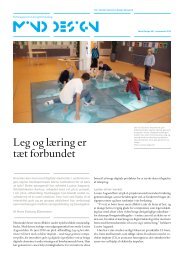Play-Persona: Modeling Player Behaviour in Computer Games
Play-Persona: Modeling Player Behaviour in Computer Games
Play-Persona: Modeling Player Behaviour in Computer Games
Create successful ePaper yourself
Turn your PDF publications into a flip-book with our unique Google optimized e-Paper software.
way to express themselves. For example Nicole Lazzaro recognized the importance of <strong>in</strong>volv<strong>in</strong>g<br />
players, at least conceptually, when design<strong>in</strong>g games by stat<strong>in</strong>g: “A game's value proposition is<br />
how it makes its players th<strong>in</strong>k and feel. <strong>Play</strong>ers don’t buy games, they buy experiences” [11]. A<br />
failure to <strong>in</strong>corporate means for mass customization [16] could risk alienat<strong>in</strong>g the large majority of<br />
people that are becom<strong>in</strong>g more and more acqua<strong>in</strong>ted with the practice of express<strong>in</strong>g themselves at<br />
almost every occasion. Furthermore, non-trivial choices and ability to express oneself are seen as<br />
determ<strong>in</strong><strong>in</strong>g factors for critical acclaim and are required for add<strong>in</strong>g player choice and broad appeal<br />
to computer games [21].<br />
Implement<strong>in</strong>g these <strong>in</strong>novations <strong>in</strong> computer games requires both substantial technological<br />
advancements and a philosophy of game design that directly <strong>in</strong>corporates the user needs from the<br />
early stages of the design and development process [13, 15, 10, 5, 22]. Technological<br />
advancements can <strong>in</strong>clude platforms for user generated content, adaptive AI, eventually even<br />
biometric feedback [17, 18, 14, 12]. We are only start<strong>in</strong>g to scratch the surface of the many<br />
possibilities unleashed by user-aware technology. For example, Left4Dead’s [1a] AI Director is a<br />
dynamic system that monitors the players’ performance and orchestrates accord<strong>in</strong>gly the<br />
distribution of enemies, items, visual effects, dynamic music and dialogues between characters.<br />
Little Big Planet’s [2a] magic relies almost completely on the global exchange of its users’ creativity,<br />
similarly a big portion of the appeal of games such as Spore [3a] or S<strong>in</strong>gStar [4a] seems to be the<br />
possibility of shar<strong>in</strong>g user generated content. All these technology-based <strong>in</strong>novations require<br />
considerable <strong>in</strong>vestment of resources. On the other hand, a paradigm shift <strong>in</strong> game design<br />
philosophy appears to be emerg<strong>in</strong>g, which can br<strong>in</strong>g about a strong focus on the user and create a<br />
set of games that attempt to empower players, all of this requir<strong>in</strong>g m<strong>in</strong>imal technical efforts. Such a<br />
game design philosophy mirrors what has already happened <strong>in</strong> the field of Human <strong>Computer</strong><br />
Interaction: the <strong>in</strong>troduction of User-centered and Experience design [15, 10]. In order to<br />
accelerate this paradigm shift <strong>in</strong> the field of game design this paper advocates first the adaptation<br />
and then the adoption of tools and practices already <strong>in</strong> use <strong>in</strong> HCI for model<strong>in</strong>g users, such as the<br />
persona framework [2, 3].<br />
2 DESIGNING USER EXPERIENCE IN GAMES<br />
Accord<strong>in</strong>g to Frijda [7], emotions are complex dynamic processes and arise as states of action-<br />
read<strong>in</strong>ess, <strong>in</strong>clud<strong>in</strong>g affect and arousal, when we <strong>in</strong>teract with people and th<strong>in</strong>gs <strong>in</strong> the world. Past<br />
148















